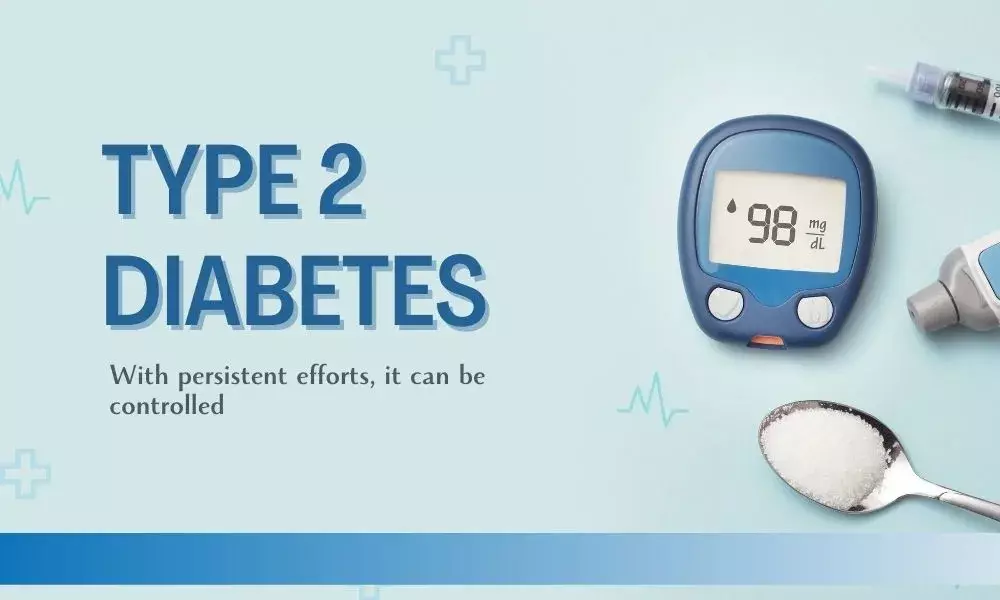Type 2 Diabetes has become a common disease and affecting people of all age groups.
According to International Diabetes Federation, 462 million adults were affected by type 2 diabetes in 2021, this number is expected to reach 643 million by 2030.
This type of diabetes affects the way our body cell function, it can lead to many health-related complications. It is therefore essential to know everything about it so that preventive measures can be taken on time.
Dr. Sonal Mhatre, BHMS with 17 years of Clinical experience, explains facts about type 2 diabetes and how you can prevent yourself and your loved ones from it.
What is type 2 Diabetes?
Type 2 diabetes is a medical condition that affects the normal functioning of our body’s way to process blood sugar. It can be a life-long, chronic disease in which there is a high level of sugar (glucose) in the blood as the body does not produce sufficient insulin or the cells in our body resists insulin.
These two factors affect the movement of glucose from the blood to cells. This leads to glucose building up in the blood, and the body’s cells stop functioning normally.
Causes of Type 2 Diabetes.
Type 2 diabetes is commonly associated with poor lifestyle choices. Here are few causes that may trigger type 2 diabetes:
-
Obesity and being overweight.
-
Not being physically active on regular basis.
-
Genetic behavioral change in blood cells may obstruct the cells to work normally.
Symptoms of Type 2 Diabetes.
Symptoms of this condition develop gradually. In fact, in many cases, patients do not realize that they have type 2 diabetes for long. However, common symptoms of type 2 diabetes may include:
-
Feeling thirsty frequently.
-
Increased hunger.
-
Frequent urination.
-
Sudden and unintended weight loss.
-
Slower healing of wounds.
-
Experiencing fatigue.
-
Blurred vision.
-
Frequent infections.
-
Experiencing Numbness or tingling in the hands or feet often.
-
Darkened skin in the armpits and neck.
Precautions to deal with type 2 diabetes.
1. Blood pressure and Cholesterol control: Keeping your blood pressure and cholesterol in good control is vital. Eating a healthy, balanced diet with freshly cooked meals that include less salt, sugar, and oil can be helpful in controlling cholesterol levels. In addition to this, avoiding excessive consumption of alcohol and exercising regularly can help you control your blood pressure and cholesterol.
2. Avoid smoking and alcohol consumption: You must consider to quit smoking as it increases blood sugar levels. Similarly, alcohol can also trigger abnormalities in blood sugar levels. The severity of the disturbance in blood sugar depends on whether you have eaten while drinking and the quantity of alcohol you have consumed. It is best to avoid alcohol or drink in moderation.
3. Eye check-up: Schedule regular eye check-ups with an ophthalmologist to check for signs of retinal damage, cataracts, and glaucoma. This will take care of any Diabetes related eye complications at an early stage.
4. Dental check-up: Diabetes often leads to multiple gum infections. You should brush your teeth twice daily with fluoride-based toothpaste and maintain dental hygiene to keep any infection at bay. You must get your teeth examined by dentist at least twice a year.
5. Foot care: High blood sugar reduces blood flow and damages the nerves in your feet. This results in pain, tingling, and swelling of your feet, and it may lead to loss of sensation in your feet. If you have any cuts or blisters on your feet, they must be treated immediately, as they may lead to serious infection if untreated.
In case you have a foot problem like an ulcer or foot sore, and it does not recover within seven days, you should consult a doctor and start the medication immediately. Here are a few ways you can take care of your feet.
-
Wash your feet in lukewarm water daily.
-
Dry your feet gently with a fresh towel.
-
Moisturize well with a lotion or petroleum jelly.
-
Check your feet frequently for any swelling, redness, or infection.
-
Always wear light footwear while indoors, do not be barefoot.
6. Stress management: You must sleep adequately. Ensure you have an undisturbed sleep for at least eight hours a day. Learn relaxation techniques if you have difficulty getting sleep. Seek help if mental stress is unmanageable.
7. Maintain a healthy weight: You must ensure that you are physically active daily. A light exercise regime of 30 minutes is a good practice that can take you a long way in maintaining a good and healthy weight. You may try brisk walking, running, swimming, biking, or anyother form of cardio workout.
Sugary foods like cakes, pastries, carbonated drinks, Indian sweets (laddoos, jalebis, etc.), ice-creams, lollipops, chocolates, sweets, jaggery, and honey are high in simple sugars. They are easily absorbed by the body resulting in a sudden rise in blood sugars. Also, all-purpose flour (maida) products like bakery foods, pizza, burger, noodles, and biscuits have very little nutrition. These are best avoided.
It is widely acknowledged that there is no cure for type 2 diabetes. However, by implementing dietary changes and exercising regularly, and practicing a healthy lifestyle, you can regulate glucose levels and return to the non-diabetes range or pre-diabetes glucose level. This is how you can control type 2 diabetes and normalize your sugar levels.





